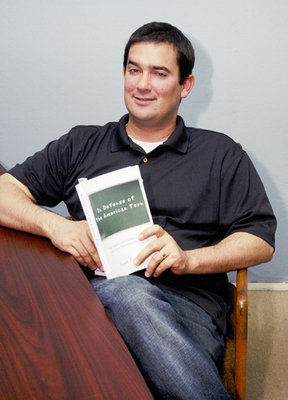
If you’ve graduated high school and regularly use what you learned in math and science classes in your everyday life, local teacher, tutor and author Ryan Teves has a question for you.
Are you a teacher?
In his recently self-published book “In Defense of the American Teen,” Teves, a Scotts Valley resident, explains that much of the curriculum taught in middle schools and high schools focuses so heavily on abstract concepts and minutiae that the majority of high school graduates who find them useful in real-world scenarios are those who become teachers.
Having worked both as a private tutor and as a math and science teacher at Harbor High in Santa Cruz, Teves said he has seen the way secondary education works from both sides of the classroom.
In the book, Teves says the standardization of education has forced teachers to adopt a rigid sink-or-swim curriculum in which all students are required to take a prescribed set of courses — regardless of their interests or natural aptitudes — in the name of improving national statistics.
“Schools began in the interest of serving children, and somewhere along the line, it got flipped around, and now the students are expected to serve the schools,” Teves said.
Instead, he says the way he would improve secondary education is to embrace relevancy and individualization, rather than pushing every student along the same path.
He uses a professional football team as an analogy:
“Never did they think that to create an elite team of finely tuned football players, it would be a good use of their resources to train every single person in America to run the fifty-yard dash faster.”
He suggests that high schools would better serve students if — once they were able to read and write, use math associated with survival in the modern world and understand a certain amount of history — they operated more like community colleges.
In that scenario, Teves said, students would be able to take classes that would prepare them for life after high school, whether they chose to continue their traditional education in preparation for college or train for a profession.
Instead, a lack of interest in the standard curriculum, coupled with hours of homework each night, leads many students to be unfairly labeled as lazy.
“Some teachers argue ‘Well, this is only an hour-and-a-half of homework,’ but with five other classes, that turns into seven hours of homework or more,” Teves said. “God forbid they should play any sports.
“The workload on a 15-year-old is more than the workload on a 40-year-old.”
By contrast, when students take classes with an obvious goal, they will be more willing and involved.
The book, Teves said, is intended to serve as a manual for parents of children in middle school and high school, so they can anticipate and understand the challenges their children will face in the education system.
Even within the existing school system, Teves said, teachers can inspire a desire to learn in their students if they can present the material in a way that shows how it could be useful.
He uses his math students as an example: For one assignment, they calculated the cost and benefit of a mortgage when buying a home — and took measurements of the floor plan of the classroom to provide a comparison.
“Without the tape measure, it just becomes dumb math to (the students),” Teves said.
At a glance
WHAT: “In Defense of the American Teen,” by Ryan Teves of Scotts Valley
WHERE: Available from Bookshop Santa Cruz, 1520 Pacific Ave., in Santa Cruz; from the Capitola Book Café, 1475 41st Ave., Ste. G, in Capitola; or online at Amazon.com.
INFO: AuthorHouse, www.authorhouse.com
To comment, e-mail reporter Joe Shreve at jo*@*********er.com, call 438-2500 or post a comment at www.pressbanner.com.












